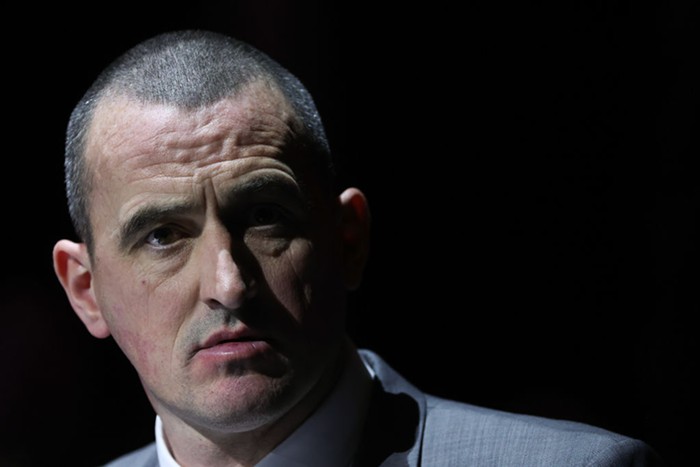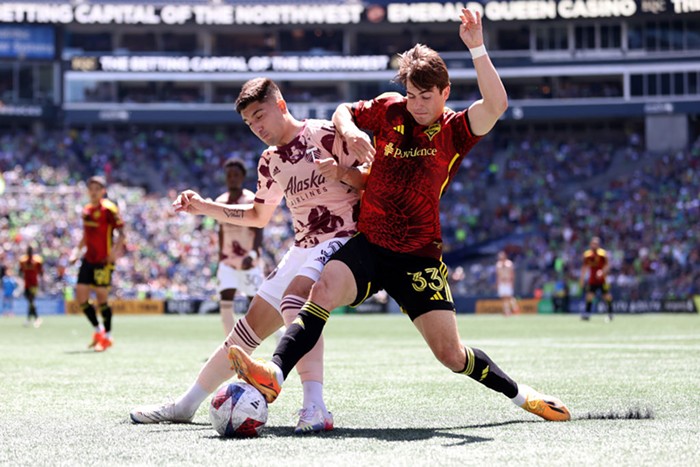Coach Franco helps Matthew into his headgear, fitting the mouthpiece over his braces. Next come Matthew’s gloves, which are nearly as big as his head. While Franco offers a few last-minute words of advice, Matthew’s father and assistant coach, Joe Charlton, rubs his shoulders. Matthew climbs through the ropes, taking his time stepping into the red corner. Across from him in the blue corner, Jesus Flores looks slightly more confident—though they’re both still young boys, doing their best to appear grown up. Matthew and Jesus meet in the center of the ring, touch gloves, and return to their corners to await the bell. The announcer, in his pork pie hat and oversized suit, paces the floor, stoking the crowd. Everyone in the gym is fired up and ready for action—everyone except Matthew, who still looks uncertain, like he might rather be anywhere else. But then the sound of an arpeggiated electric guitar—the opening of AC/DC’s “Thunderstruck”—blasts from the overhead speakers. Matthew throws a few jabs into the air and bounces on his toes. He’s suddenly transformed.

On a frigid afternoon in early January, while the city was still buried beneath thick layers of snow and ice, approximately 300 people—some having traveled from as far away as Seattle—gathered together in a basketball gym at the Moore Street Salvation Army for Portland’s first amateur boxing match of the year. Informally called a “smoker,” these bouts are typically held once or twice a month, in the downtime between bigger-stakes tournaments like the Golden and Silver Gloves. Different boxing gyms throughout the region take turns hosting these meetups, and this afternoon’s smoker was hosted by Rip City Boxing, a local club for kids age nine to 15, led by head coach James Franco.

Of the roughly half-dozen boxing clubs in the greater Portland area (not including MMA or kickboxing), Rip City Boxing is one of the newest, started in May 2016 by Franco and Joe Charlton. Franco first began assistant coaching five years ago with Knott Street Boxing Club, one of the nation’s most renowned amateur teams. He and Charlton left Knott Street last May, bringing eight kids with them, including Franco’s son, Santiago, and Charlton’s son, Matthew. This new club didn’t yet have a name, or even a gym, and trained in Franco’s basement with equipment he’d purchased himself. When the Boys and Girls Club, sponsored by the Portland Trail Blazers, offered Franco’s fledgling team the use of their space, they began calling themselves Rip City Boxing—and while the deal eventually fell through, they decided to keep the name. The Salvation Army soon agreed to let them train at their Moore Street gym. Rip City Boxing has since grown from its original crew of eight to nearly 30 kids. Though only 15 are registered to compete in tournaments, Franco puts all his kids through the same regimen.

“Everyone is welcome to come here, take part, and do the fitness,” Franco says. “But when it really comes down to it, we’re an amateur boxing team. You don’t have to compete if you don’t want to. You don’t even have to spar if you don’t want to—but all we ask is that while you’re here you work just as hard as everyone else.”
One of these kids, 13-year-old Exson Sanchez, began boxing as a nine-year-old at Seattle’s White Center PAL Boxing Club. After moving with his family to Longview, Exson joined Knott Street, where he went on a 28-0 winning streak, then followed Franco to Rip City.
“Some kids come into boxing, saying, ‘I want to learn boxing so I can beat people up, or beat up on other kids,” Exson says. “But your mentality changes once you start training. You get more discipline.”
Franco’s son, Santiago, also 13, agrees.
“I didn’t really have that much self-respect,” he says about his first foray into amateur boxing. “But realizing that you’re losing weight, getting stronger, faster, and you have more endurance—it changes your physical as well as mental attributes.”
“Knowing you can win, and you’re good at a sport, that makes you feel confident about yourself,” Exson says. “I like [boxing], because it keeps me in shape, and out of trouble.”
 Gabriel Green “Knowing you can win, and you’re good at a sport, that makes you feel confident about yourself,” Exson says. “I like [boxing], because it keeps me in shape, and out of trouble.”
Gabriel Green “Knowing you can win, and you’re good at a sport, that makes you feel confident about yourself,” Exson says. “I like [boxing], because it keeps me in shape, and out of trouble.”

Santiago has advanced four times to national championships; Exson is a two-time National Silver Gloves champion and National Junior Golden Gloves champ.
For most of these kids, amateur boxing offers an opportunity to travel the country, and meet other kids like themselves in cities and towns they might never have seen. As many of them are the sons and daughters of immigrants—and often find themselves at the center of our nation’s ongoing and hurtful debates—boxing can be a way for these kids to find their place in this country, to be rewarded for their contributions rather than denounced.
Rip City Boxing is a 501(c)(3) nonprofit, one of only a handful of nonprofit boxing clubs. Franco, Charlton, and lead trainer Reggie Davis—himself a pro boxer—all volunteer their time and effort. Gloves, uniforms, equipment, and travel expenses for regional and national contests all come from donations, selling homemade tamales, or often, out of Franco’s own pocket. The 15-dollar monthly membership cost goes to the Salvation Army. Aside from their nonprofit status and their status as relative newcomers, Rip City also differs from many other boxing clubs in their approach to coaching.
“We don’t believe in yelling at a kid,” Franco says. “To me, barking at people, getting on their case all the time may be what a kid hears at home. So for the couple of hours they come to the gym, they don’t want to hear that. They need encouragement. And you have certain situations where they want to be in the gym because they don’t want to go home.”
The reasons for joining an amateur boxing club vary, but it rarely comes from the desire—at least initially—to turn pro and become rich and famous. Rather, the kids talk about the exercise, confidence, and the camaraderie they get from boxing that they don’t get in school or other sports.

“My son was kind of getting picked on at school,” says Charlton’s wife, Kate, the mother of 11-year-old Matthew. “He always did well in school, but he was super quiet and shy, and didn’t know how to put himself out there very well. So we thought this would pull him out of his shell and get him talking to people and socializing. He took to it right away. They’re super supportive of each other. Even kids from other teams, other places, they’re always congratulating each other.”
Matthew began boxing in 2015, at Knott Street, and had his first boxing match just one year ago. He admits he’d been slow to learn, constantly losing matches. But he kept coming back, continuing to train.
“It’s given me a lot of confidence over the years,” he says. “I did get bullied a lot, and now I don’t.”
Matthew is scheduled to compete at today’s smoker at the Salvation Army. Eighteen different boxing clubs are represented, braving snow, ice, and ungodly cold to travel from all over Oregon and Washington. Matthew’s competitor is Jesus Flores, from Renton, Washington’s Azteca Boxing Club. Both kids are 11 years old, weighing in at 75 pounds.
“He’s nervous because this is a rematch, and he lost to him at our last show,” explains Joe Charlton. “He knows he’s got to bring it with this club he’s going up against.”
As Matthew gets his hands wrapped and listens to pre-fight encouragement from Franco, he does look a little distracted, but he does his best to show a brave face.
“We call him Little Lightning,” Charlton says about Matthew. “You’ll hear it when his song comes on—‘Thunderstruck.’”

The roughly 300 people standing on the gym floor or crowded together on the bleachers are a mix of burly Latino men with shaved heads, suburban families, and high school students. The mothers of the young boxers stand behind tables, selling Rip City Boxing shirts, homemade posole, tamales, soda, and candy. Kids shadow box in the corner, warm up with their coaches, or catch up with buddies they haven’t seen since the last fight. Given the current political climate, where it feels as though all of us are becoming more and more at odds with each other, watching these kids come together—from many different cultural, ethnic, and class backgrounds—is both inspiring and restorative. Outside this gym, our country is beginning one of the most bitter and rancorous eras in modern history, but here, inside the Salvation Army basketball gym, everyone is smiling and laughing, happy to see each other again, and there is hardly any animosity between the kids or their parents—which is even more impressive, given they’re all here to watch their kids punch each other repeatedly in the face.

Matthew’s fight is the 10th of the day. After being fitted into his protective gear, he climbs into the ring as the announcer introduces the two fighters. Matthew and Jesus touch gloves, then return to their corners. Franco crouches beside Matthew to impart some final advice, then exits the ring. The referee gives the signal and the bell rings. Matthew and Jesus quickly approach the center of the ring, right away throwing wild punches. Each boy lands clean, hard blows. Jesus has better form, but Matthew’s long reach keeps his opponent from getting too close. Matthew takes a few blows to the side of the head, and returns just as many. Where Matthew was previously quiet and reserved—the quiet, picked-on boy at school—he is now, inside this ring, a focused and grimly determined boxer. He and Jesus get wrapped up a few times in the second round, taking turns against the ropes, and by the third round, Matthew looks tired and is throwing fewer punches.
After the final bell rings, both fighters meet in the center with the referee, awaiting the results from the judges. It could go either way. After a few tense seconds, the winner is announced: the red corner, Matthew Charlton, from Rip City Boxing. Matthew throws both hands up ecstatically, and shouts loud enough to be heard above all the applause. He collects his trophy, then jumps out of the ring and is mobbed by his teammates, Coach Franco, and his family. Matthew giggles as his parents kiss him and congratulate him, and just like that, he’s once again a shy and happy boy.















